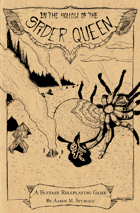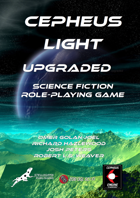Of late, I have been ordering books instead of PDFs from DriveThruRPG. Someday, I'll have something worthy of a shelfie. In the meantime, I need to complete this series of 52 reviews in 52 weeks. This title, Cepheus Light Upgraded tallies in at 7 from the end.
My apologies, there is no significance to the numbers or order of reviews. I have nothing planned for "the last review" because while the series will end, the reviews will not. I've enjoyed this series very much and wish to keep the idea alive in 2022. I'll probably slow down a bit, but we'll see.
(No really, I'll slow down. 52 reviews in 52 weeks is like drinking from a firehose.)
This isn't lucky #7, I just happened to get lucky with topic selection when significant numbers came up.
I suppose I could do a review of DriveThruRPG's print option, but right now we're dealing with a supply chain jam. I'd be crapping on some hard-working people. I'll just leave it at every title I've ordered has been great. If you are seeing dings, scuffs, or creases, it's because I'll take my books anywhere. I'm rather abusive with my copies and these print-on-demand titles are tough enough to take it.
Title: Cepheus Light Upgraded
Rule Set: Cepheus Engine
Year: 2021
Author: Omer Golan-Joel, Richard Hazelwood,
Josh Peters, Robert L. S. Weaver
Publisher: Stellagama Publishing
Pages: 118 pages
Rating: 5 of 5 Gold Stars |
|
I'm a sucker for great art and while this book doesn't disappoint, the "gold" rating was locked in by the excellent "About the Authors" section. All four authors get a paragraph each which was very informative and descriptive. While it's impossible to tell which author contributed to which portion of the rules, this section conveys the pedigree of this edition of the ruleset and the writers. I love it.
I'll start with the nit-picky stuff and of course, being 5 stars, there isn't much.
First, this is a PDF in print format. The empty front page is a giveaway. Next, the "Usability" section comes too soon. It needs to appear after the About the Authors section and the Stellagama Publishing paragraph. Those sections are just as distinct from the rules as the Introduction and would serve little purpose anywhere but the front matter of this edition. The third nitpick is the word "traits" which appears in random places. Obviously, there is a high-level concept here, which is only handled tangentially and it's up to the reader to decipher the meaning. Looking around, it's a character ability in line with skills as opposed to the more fundamental characteristics. It's not much of a "problem", it is more of an observation of personal confusion. I don't grok Traveller or its variants easily so I got a tiny bit confused.
Like D&D, there are 6 stats. They deviate from the D&D model as they pass down to the "skill" level in different ways. Yes, they can create a modifier, but sometimes they do more. For example, your character cannot have more skills than their combined Education and Intelligence score. Characters also have a Social Standing stat which controls the number of contacts they can have.
Were it not for these "combos of ideas" there would be three obvious dump stats. The beauty of these stats is the idea tends to reward rather than punish. Contacts are a great example. These people aren't retainers or companions, they are resources that feed adventures and adventurers alike. They are far more flexible as a resource than any retainer.
Character generation isn't much of a hurdle. Roll 2d6 six times and you are good to go. But not really. This ruleset brings back memories of MUDDing, where once you have your characteristics, you build your character's skill sets. You can't have everything as each skill takes time to develop. Initially, your character learns skills at a rate of 1 skill every 2 years then shifts to 1 skill every four. As you increase your "rank" or more correctly prestige and competence, you gain bonus skills. The downside of this is, you run the risk of injury, loss of characteristic scores, or even death as you age. As a fifty-year-old, that seems very right.
In preparing for this review, I rolled 7 characters. The first one, I botched some things and abandoned him or her. The next six characters were generated much more smoothly. There is an "unlearning curve" if you play other games. You need to forget all of that other stuff. D&D, this is not.
In generating 6 characters, one of each type, I found there was very little need to fiddle with the dice. It is just unlikely that you'd roll a 2-4 as you'd roll a 10, 11 or 12. No characteristic score really hampers character creation, you can be what you want to be despite poor rolls. In fact, some poor rolls create great characters. Each character has 18 different skills to choose from plus random events which modify each character. Every character feels handcrafted and unique while remaining plausible.
Additionally, the rules assume teamwork. There is a tiny, tiny section on collaboration which is a simple and powerful tool. If a character has a matching skill set, they can turn a single project into a cooperative event. Even if the characters don't have exactly matching skills, they can still participate. Even if it's an "Of course, you can help! Hold this flashlight," moment. While not every character can mechanically participate, the referee can break tasks and parties down into manageable cooperative events which build up the group as a team. Or creates opportunities for sabatage. It depends on how your gang rolls.
Even though this is a sci-fi ruleset, there is the opportunity to add a touch of magic to your character in the form of cybernetics and psionics. With the exception of one character who lost an arm in the creation process, I didn't touch on cybernetics. The guy has one prosthetic arm which is not very special. It does lead to some unique character background which I will touch on in another post. Let me close this topic by restating that I generated 7 characters and only one had a significant injury. No one died or experienced a serious age crisis. And yes, to prevent "superpowerism", the rules impose harsh penalties for getting too old for the sake of more skills.
The rules contain an adequate selection of vehicles, spaceships, weapons, and equipment. While no setting information is included, understand that this is not a good fit for Star Wars or Star Trek. It's more "hard" science fiction than Trek and nothing like the fantasy of Star Wars, while not tapping the diamond hardness of Orion's Arm. It's a great compromise as I suppose you could touch on ideas of all three without jumping the shark.
The combat section is efficient and realistic, to a degree. These characters are far more likely to be completely unarmed and unarmored than typical science fiction types. Depending on your setting, combat might not be the thing that does in your characters. Guns are pretty lethal, without going into crazy gun tropes. Apparently, there are no disintegrations. Weapons are probably not a good tool in this ruleset and as a consequence, probably won't be the driving feature of your adventures. Cepheus Light is more the 1960s or 1970s Stainless Steel Rat type stories where death by weapons fire is more a consequence of poor planning than any planning.
I have decided to pull out the Spaceship generation section for a later time. It's great but not something I could digest in a couple of days. I understand some of it, so we can leave it as the pregenerated ships are easy to use and mirror the combat characters to a degree. If you are thinking of having a space battle wargame, this probably isn't the ruleset for you. You could, but maybe you shouldn't.
Building a ship from scratch is an option, but it is a pricey and time-consuming effort. This could use a few hundred to a few thousand words all on its own. I can't wait to do that, but maybe later this month. One of the better ways to break a game is to include shipbuilding rules. Cepheus Light like Traveller tends to avoid that possibility by cranking up the "science" in the "science fiction". I find it amusing that both Traveller and Cepheus Engine handwave problems by invoking science and math. That is perfectly awesome.
To recap, character generation is a unique minigame that sparks creativity while not being particularly murderous or time-consuming as many events can be modified away with cybernetics and luck. All and all, these rules are simple and easy to use which can provoke further expansion and complexity, if one wishes, without requiring more and more. Reviewing Cepheus Light was informative, charming, thought-provoking, and fun. I can't wait to run a session.
Expect to see some follow-up posts to tag off of this review.













